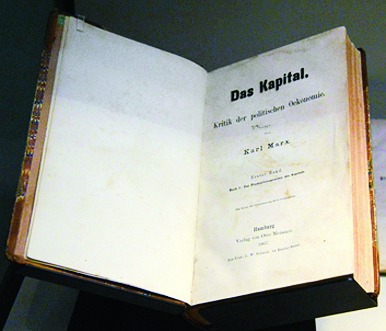
KARL MARX'S 'CAPITAL' AND THE PRESENT: FOUR ESSAYS By C.P. Chandrasekhar, Tulika, Rs 350
This slim volume, written by a distinguished economist stationed in Jawaharlal Nehru University, New Delhi, is a tribute to Karl Marx on the occasion of the 150th year of publication of Capital, volume 1. With a Foreword by Prabhat Patnaik, it comprises four lectures, delivered under the auspices of the Safdar Hashmi Memorial Trust (Sahmat). There are two central themes underlying these lectures. First, it provides an analysis of Marx's study of how capitalism functions essentially as a crisis-ridden system, in spite of its apparent resilience. Second, it addresses the crucial question of 21st-century capitalism, namely, how relevant is Marx's analysis of capitalism today in an age when neo-liberalism appears to be wildly triumphant? The answer to the first question is provided by taking the cue from Capital, this exercise being rather technical for obvious reasons. Understandably this discussion centres around the concept of commodity production, the crucial distinction between labour and labour power, the notion of primitive accumulation, the difference between absolute and relative surplus value, the tendency of the rate of profit to fall and so on. Marx used these concepts to drive home the point that the crisis of instability is inherent in capitalism, since its naked drive for extraction of surplus value inevitably results in growing pauperization of the workers, leading to the sharpening divide between the two. It thereby unfolds a process which imperils the very foundation of capitalism.
The second question is, indeed, very topical but the author's response could have been more nuanced. In spite of bouts of crises, it is undeniable that capitalism has not collapsed; rather, it has established its credibility in the sense that, following the end of the Soviet era, no alternative system is in sight, at least in the immediate future. So the question: is Capital still relevant? The author rightly points out that Marx's project of Capital remained incomplete, as he could not touch upon the question of state, foreign trade and the world market, and so the answer to the question relating to the stubborn resilience of capitalism in the form of neo-liberalism may not be directly traced to Marx. He points out further that the main levers of neo-liberalism being speculative capital, new technology and usurpation of the peripheral zones of the world, the crisis it generates by intensification of mass discontent is almost insurmountable, the reason being the impossibility of the neo-liberal State to resort to the strategy of welfarism, as practised earlier. What, however, requires to be analysed is how neo-liberalism legitimizes itself by securing the consent of the governed, thereby making it easy for the Right to score its victory. Besides, it needs to be examined how the interplay of electronic technology and capital has facilitated neo-liberalism's manipulation of the mind of the masses in a direction that blunts the resistance against Capital.
While the spirit underlying the book is certainly noteworthy and deserves attention, commemorating Capital in the 150th year of its publication perhaps demands reference to two path-breaking studies on this seminal work of Marx. One is Reading Capital by Louis Althusser and Étienne Balibar, published in 1968, when the Left was engaged in examining the significance of the publication of Capital on the occasion of its 100th year. The other work came out from France in 2013 under the title Capital in the Twenty-First Century, by Thomas Piketty. The book has raised very important questions which need to be reckoned with.










